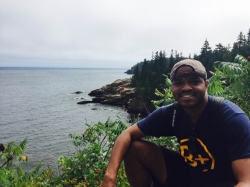Mario Williams
Teaching Assistant
Bio:
I am broadly interested in paleoecology and historical ecology. I use geohistorical data to learn about past environmental conditions and biotic interactions, in order to inform our understanding of modern environmental change and recent shifts in biological communities. Multi-decadal studies and those that investigate phenomena over much longer timescales (centuries to millenia) allow us to identify long-term patterns, detect anomalies, and interpret present-day observations within their appropriate historical, spatial, geological and ecological contexts. Consequently, paleoecological studies are increasingly important for deciphering the rates of change, ecological impacts and biotic responses that define the most critical global environmental problems of the 21st century, including climate change, biodiversity loss, biological invasions and eutrophication of waterbodies.
Research Area:
Past research involved the study of the evolution of molluscan life history traits (egg size) in the northern Gulf of Mexico. Specifically, I investigated the effect of coastal eutrophication on marine bivalve communities along an east-west gradient in the Gulf of Mexico. Current research interests include investigating the ecological and human-environmental past of the Caribbean island, Jamaica, and specifically, examining linkages between fire, vegetation, and climate on the island throughout the Holocene.


